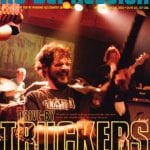Todd Steed – Sphere of influence
Todd Steed can remember the first song he ever wrote about Knoxville. He was in a punk band in the early 1980s called the Real Hostages: “We would write about the local radio station, and how we hated it,” he says.
It was the beginning of a music career that has made Steed, now 41, a cornerstone of the East Tennessee city’s ever-changing scene. Bands have come and gone in Knoxville, and Steed has known most of them, drunk with most of them, shared stages with most of them. Through it all, with a succession of his own outfits (Smokin’ Dave & the Premo Dopes, the Opposable Thumbs, Apelife), he has kept writing songs. And a lot of those songs have been about Knoxville: loving it, hating it, leaving it, coming back to it (from Indonesia, among other places, where he taught English for a few years), laughing at it, crying for it.
“I never consciously said, ‘Oh, it’s time to write a Knoxville song,'” he says. “I just wrote about what was happening. And usually that was happening in Knoxville.”
A few years ago, Steed went to see Ray Davies play at a Knoxville theater. At one point, the Kinks leader, whose catalog is rife with songs about specific places and people, turned to the audience and said, “Hey, you songwriters out there, you need to keep writing about what’s going on around you. Write about your hometown.”
“I figured I couldn’t turn him down,” Steed says. He started planning an all-Knoxville project. It got a boost last summer from a state fiscal crisis. In his day job, Steed is coordinator for study abroad programs at the University of Tennessee. When the campus briefly closed during a shutdown of state services, Steed sat down to write and then called some friends over to his North Knoxville home.
Over time, those friends included more than twenty musicians representing a cross-section of the city’s bands, from poet-rocker R.B. Morris to postpunk heroine Kat Brock to a de facto reunion of the late, great V-Roys. The resulting disc, Knoxville Tells, was released under the name Todd Steed & the Suns Of Phere — a typically Knoxville-centric reference to the Sunsphere, the glittering gold ball that is the most visible legacy of the city’s 1982 World’s Fair.
Steed admits the album is something of an anomaly in an era of mass media and globalization — a defiantly local project in both content and personnel, unconcerned with whether anyone outside the city limits gets the references to Highway 11E and East Town Mall.
Musically, it veers from twangy two-step to the gospel strains of “Nobody Listens To Me” (the lament of a worker laid off from Knoxville’s Levi’s plants, which closed a few years back) to Morris’ jazzy, spoken-word “Sunrise Over Fort Sanders”. There are odes to local prank-phone-call legend John Bean and skinny-dipping in the Smoky Mountains; there’s also “New Knoxville Girl”, an update of the most famous Knoxville song ever written (although what gets killed off this time is a local microbrewery — “I miss that beer,” the narrator moans).
Steed notes that a lot of art is about finding something universal in your own backyard. After all, before John Lennon, nobody outside Liverpool had ever heard of Strawberry Fields.
“It’s fairly recent, this phenomenon of music getting out of the community and becoming this shiny, big money machine,” Steed says. “I don’t mean that negatively, necessarily. But music historically has always been created for the community.”
Community was also central to recording the album. In a way, it’s as much a celebration of the Knoxville music scene — and the whole idea of a music scene, where people know each other and play gigs with each other and show up on each other’s porches — as it is of the city itself. Steed says that the process “was kind of like an extended birthday party,” with friends trooping in and out of the house, trading licks and ideas and verses.
While he’s written plenty of non-Knoxville songs, many of them available on the discs by his other bands (which are worth seeking out for fans of intelligent, inventive roots-rock), Steed says the local focus of Knoxville Tells helped remind him of what’s valuable about his Appalachian hometown. It’s worthwhile “to try to explore your city like it’s a tourist destination, like it’s an interesting place,” he suggests. “It’s just a reminder that your city is full of stories and interesting people and places and tragedies.”
And that’s a universal truth, whether or not you know where Kenilworth Lane is.
“Everybody has a hometown,” Steed says. “So if you write about being at war with your hometown, or falling in love with your hometown, people do get it other places.”




